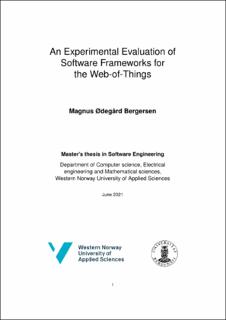| dc.description.abstract | In this thesis we evaluate the Web of Things technology. The Research-based Innovation scheme in Norway has started a project named Smart Ocean, which explores new technologies to develop ocean monitoring solutions. This is where Web of Things comes into the picture. As Internet of Things tends to results in fragmentation of applications, due to of re-use code, Web of Things has been suggested to provide more standardised solutions. We evaluate four different frameworks developed for the Web of Things. We use case studies provided from the Smart Ocean project to replicate a real case scenario where the frameworks are in use. As we create different prototypes for the Smart Ocean project, an approach is required to evaluate the frameworks, and then in turn the technology. Here we are using the ISO/IEC 25010:2011 standard, which is the standard for software quality requirements and evaluation. We use the software quality model to define evaluation criteria which can be used for this thesis. We evaluate based on maturity, learnability and security, as these are considered the most important aspects from the frameworks. We additionally perform evaluation based on criteria identified during the development process, including automation, documentation and amount of code. Based on the evaluation criteria, we access the state which the technology currently is in. By doing so, we find some interesting results about the frameworks, which also generalise for the technology itself. Our evaluation shows that all frameworks evaluated in this thesis had a few critical flaws, which would be enough to have devastating effects on the case studies. As the frameworks are recommended by the creators for the technology, this means there are some issues involving the matureness of the technology. We conclude in the end that the current state of the technology is too weak to be used for a large scale project like Smart Ocean. We conclude that with the present state of the technology, the Smart Ocean project would be better off using alternative Internet of Things solutions which has taken care of the flaws which the Internet of Things provides. | |
